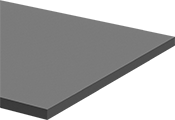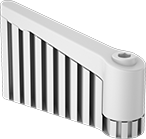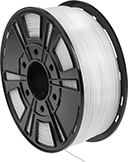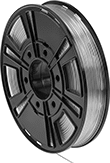Compare over 25 types of plastic to find the right material for you.
Rigid Polysulfone Rods

- Color: Semi-Clear Amber
- Temperature Range: -40° to 285° F
- Tensile Strength: 11,800 psi (Good)
- Impact Strength: 1.3 ft.-lbs./in. (Poor)
- Hardness: Rockwell M120 (Extra Hard)
- For Use Outdoors: No
- Specifications Met: FDA Compliant 21 CFR 177.1655, UL 94 V-0
Use these hard, rigid rods to make tool handles and other parts that require autoclaving. Polysulfone resists expanding and maintains its strength when exposed to heat and steam.
Rigid Polysulfone Sheets

- Color: Amber
- Temperature Range: -40° to 285° F
- Tensile Strength: 11,800 psi (Good)
- Impact Strength: 1.3 ft.-lbs./in. (Poor)
- Hardness: Rockwell M120 (Extra Hard)
- For Use Outdoors: No
- Specifications Met: FDA Compliant 21 CFR 177.1655, UL 94 V-0
Widely used to make parts that require autoclaving such as trays and handles, these hard, rigid sheets are easy to machine and thermoform. Polysulfone resists expanding and maintains its strength when exposed to heat and steam.
6" × 6" | 12" × 12" | 12" × 24" | |||||
|---|---|---|---|---|---|---|---|
| Thick. | Thick. Tolerance | Each | Each | Each | |||
| 3/8" | 0" to 0.025" | 00000000 | 000000 | 00000000 | 0000000 | 00000000 | 0000000 |
| 1/2" | 0" to 0.025" | 00000000 | 00000 | 00000000 | 000000 | 00000000 | 000000 |
| 5/8" | 0" to 0.025" | 00000000 | 00000 | 00000000 | 000000 | 00000000 | 000000 |
| 3/4" | 0" to 0.025" | 00000000 | 00000 | 00000000 | 000000 | 00000000 | 000000 |
| 1" | 0" to 0.025" | 00000000 | 000000 | 00000000 | 000000 | 00000000 | 000000 |
| 1 1/2" | 0" to 0.025" | 00000000 | 000000 | 00000000 | 000000 | 00000000 | 00000000 |
| 2" | 0" to 0.025" | 00000000 | 000000 | 00000000 | 000000 | 000000 | 00 |
Structural Support 3D Printer Filaments

with your part to prevent the
part from losing its shape

When 3D printing a model with overhangs or hollow spaces, use these filaments to prevent the model from losing its shape. They support the structure during the printing and cooling process, then dissolve or snap away once the part is hardened. Use them in dual-extrusion fused filament fabrication (FFF) printers alongside your primary filament. Unlike parts with supports printed from a single filament, there’s no cutting, sanding, or polishing required.
Choose a filament that has similar printing requirements as your primary filament. You will want to choose a support filament that prints at a similar temperature as your primary filament and has the same requirements for a heated build chamber, so they cool at the same rate and won’t warp. PSU blend filaments work with high-temperature plastic, such as PEEK and PEI, and require a heated build chamber.
You should also consider how you will remove the structural support filament from your finished part. Break-away filaments are designed to cleanly snap off of your primary parts with your hands while the print is still warm, taking only minutes to fully remove.
Spool | |||||||||||
|---|---|---|---|---|---|---|---|---|---|---|---|
| Dia., mm | Printing Temp. | For Printer Bed Temp. | Hardness | Max. Exposure Temp. | For Min. Nozzle Opening Dia., mm | Dia., mm | Dp., mm | Wt., g | For Use With | Each | |
Break Away | |||||||||||
PSU Blend—Clear | |||||||||||
| 1.75 | 350° to 380° C 662° to 716° F | 120° to 160° C 248° to 320° F | Rockwell R125 (Hard) | 180° C 356° F | 0.4 | 200 | 35 | 500 | PEEK Plastic PEI Plastic PEKK Plastic PPS Plastic PPSU Plastic PSU Plastic | 0000000 | 0000000 |
Steam-Resistant High-Temperature PSU 3D Printer Filaments

Sterilize your printed parts without them expanding, deforming, or weakening. These PSU filaments resist steam and heat, so you can sterilize parts in an autoclave. They also can be sterilized with ethylene oxide, radiation, plasma, dry heat, and cold sterilization methods. Print these filaments on a fused filament fabrication (FFF) 3D printer. Because of their high melting points, you'll need an all-metal extruder and heated printer bed to reach their minimum printing temperature. Without the heated printer bed, parts will cool too quickly and warp.
Tensile strength is the best measure of a filament’s overall strength. Similar to the stress applied on a rope during a game of tug-of-war, it’s the amount of pulling force a material can handle before breaking. A higher rating means a stronger filament. A tensile strength of 5,000 psi and above is considered good; 12,000 psi and above is excellent.
Maximum exposure temperature is the point at which a printed part will begin to deform. Above this temperature, your part will start to lose structural integrity.
Spool | |||||||||||
|---|---|---|---|---|---|---|---|---|---|---|---|
| Dia., mm | Printing Temp. | For Printer Bed Temp. | Tensile Strength | Max. Exposure Temp. | For Min. Nozzle Dia., mm | Dia., mm | Dp., mm | Wt., g | Color | Each | |
PSU Plastic | |||||||||||
| 1.75 | 350° to 380° C 662° to 716° F | 140° to 160° C 284° to 320° F | 10,730 psi (Good) | 172° C 342° F | 0.4 | 198 | 42 | 500 | Semi-Clear Beige | 0000000 | 000000 |





























